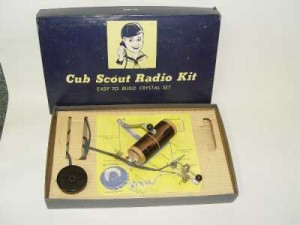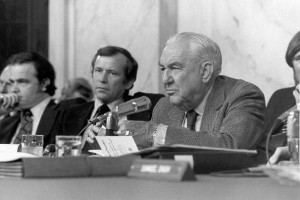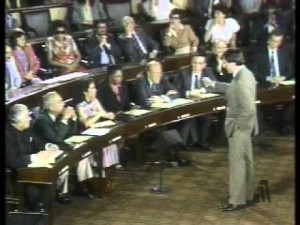The purpose of this site is to discuss sensible solutions to political issues and to renew the American spirit of tolerance and unity.
I think of myself as the cockeyed optimist Rogers and Hammerstein wrote about in “Oklahoma”, an old-fashioned Minnesota Democrat whose political heroes were Hubert Humphrey and Walter Mondale. Growing up in the 60’s as I did, it was impossible not to have at least a modicum of political awareness, although my interest in the topic started in a way I think is uniquely my own.
I was in the first grade in 1960 when John Kennedy ran against Richard Nixon, and though I was only 7 years old I have a distinct memory of standing outside our little Catholic school in south Minneapolis waiting for the bus to take me home when the other kids began chanting political slogans. Half of them yelled, “Kennedy, Kennedy, he’s our man. Nixon belongs in the garbage can.” Naturally, the other half answered using the same slogan with the names reversed. Since Kennedy was a Catholic like me and I was also half-Irish, I felt an affinity for him. And when I got home, I asked my mom if we were Democrats or Republicans and she said we were Democrats, so I was pretty much locked in.
 Once Kennedy was elected, I can remember watching some of his news conferences on television and I even got some of his jokes. And I was a space nut, so when Alan Shepard, John Glenn, Gus Grissom, Scott Carpenter and the other Mercury astronauts flew, I carefully watched every launch and listened when President Kennedy made speeches about them. By the time Lyndon Johnson took office, I was into electronics. My dad and I put together the small crystal radio set shown here for a Cub Scout project and I would listen to it in bed at night. It only picked up one station, WDGY, a rock-and-roll station which at that hour often ran a call-in show called “Your Opinion, Please” hosted by Bill Deihl. The program was a tame affair by today’s standards – after all, it was the era of “Mad Men” when advertisers were scared to offend anyone – but it felt good to hear people talk about issues. I was particularly interested in discussions about Johnson because our own Senator Hubert Humphrey was his Vice-President. I can remember being shocked when I heard Johnson’s speech on my little radio when he announced that he wouldn’t be running for re-election. I just didn’t understand his decision at all because I was so young and politically naive.
Once Kennedy was elected, I can remember watching some of his news conferences on television and I even got some of his jokes. And I was a space nut, so when Alan Shepard, John Glenn, Gus Grissom, Scott Carpenter and the other Mercury astronauts flew, I carefully watched every launch and listened when President Kennedy made speeches about them. By the time Lyndon Johnson took office, I was into electronics. My dad and I put together the small crystal radio set shown here for a Cub Scout project and I would listen to it in bed at night. It only picked up one station, WDGY, a rock-and-roll station which at that hour often ran a call-in show called “Your Opinion, Please” hosted by Bill Deihl. The program was a tame affair by today’s standards – after all, it was the era of “Mad Men” when advertisers were scared to offend anyone – but it felt good to hear people talk about issues. I was particularly interested in discussions about Johnson because our own Senator Hubert Humphrey was his Vice-President. I can remember being shocked when I heard Johnson’s speech on my little radio when he announced that he wouldn’t be running for re-election. I just didn’t understand his decision at all because I was so young and politically naive.

When Nixon beat Humphrey in 1968, it was a big disappointment. When McGovern ran in 1972, and his campaign disintegrated before it even started, I was a bit disillusioned. I had actually favored Ed Muskie in the Democratic primaries, but McGovern was “our” candidate and at least he was from a neighboring state, so I was on board. Then, of course, in 1973 Watergate exploded. That summer, the Senate committee on Watergate started to hold hearings and it was being televised live on PBS. I was painting our two-story colonial house at the time and (odd as it feels now) I ran a power cord to a portable TV outside with me so I could listen and occasionally watch. That was the first time I’d seen statesmanship from both parties. You couldn’t help but be charmed by Sam Irvin, the senior senator from North Carolina who was the chairman. He was a large jovial man with gray hair, and his southern accent with a slight stutter made him look like he’d come straight out of Central Casting. He often referred to himself as a “simple country lawyer”, but you couldn’t watch him for 5 minutes without knowing that he was a force to be reckoned with. The epiphany for me was watching the vice-chairman, Republican Senator Howard Baker from Tennessee. Baker was just as smart as Sam Irvin, and he oozed integrity. Watching him forced the realization on me that there were statesman on both sides of the aisle. It could be wishful thinking or selective memory on my part, but my recollection of those hearings is that there wasn’t much political posturing in those hearings by either the senators or the staff attorneys. In any case, those hearings had a profound impact on my political outlook and brought back my optimistic outlook.
 My respect for politicians of all persuasions was reinforced when I saw a series on PBS (originally broadcast on The Learning Channel) in the 1980’s called “The Constitution: That Delicate Balance”. It was produced by legendary newsman Fred Friendly, who was one of “Morrow’s Boys” from the “See It Now” show back in the McCarthy era and who later became president of CBS News. The show consisted of a panel of politicians, journalists, and businessmen who were presented with hypothetical situations that focused on the major political issues of the day by a moderator who posed questions in a Socratic style. There were luminaries like Supreme Court Justice Antonin Scalia, former President Gerald Ford, US Attorney Rudy Guliani, Senators Orrin Hatch and Chris Dodd, and a young Congressman Barney Frank, along with notable attorneys like Gerry Spence and journalists like Peter Jennings – all speaking their minds without a script and without simply spouting their party’s punchlines, and thoughtfully discussing how Constitutional principles applied to practical situations of the time. There are several episodes of the show on YouTube – check it out.
My respect for politicians of all persuasions was reinforced when I saw a series on PBS (originally broadcast on The Learning Channel) in the 1980’s called “The Constitution: That Delicate Balance”. It was produced by legendary newsman Fred Friendly, who was one of “Morrow’s Boys” from the “See It Now” show back in the McCarthy era and who later became president of CBS News. The show consisted of a panel of politicians, journalists, and businessmen who were presented with hypothetical situations that focused on the major political issues of the day by a moderator who posed questions in a Socratic style. There were luminaries like Supreme Court Justice Antonin Scalia, former President Gerald Ford, US Attorney Rudy Guliani, Senators Orrin Hatch and Chris Dodd, and a young Congressman Barney Frank, along with notable attorneys like Gerry Spence and journalists like Peter Jennings – all speaking their minds without a script and without simply spouting their party’s punchlines, and thoughtfully discussing how Constitutional principles applied to practical situations of the time. There are several episodes of the show on YouTube – check it out.
My awareness of good men and women in politics was expanded back in the 1980’s, during a time when I would often work on my computer into the wee hours and there was nothing on television worth keeping on in the background except C-SPAN. I would listen to lengthy, obscure Congressional hearings into all sorts of topics. Several politicians stood out for their intelligence and integrity. I could listen to Senators Joe Biden and Warren Rudman for hours on end. Both men focused on fact-finding and improving the government, not scoring political points. And Congressman Les Aspin from Wisconsin, who was the chairman of the Armed Services Committee, knew the Defense Budget backward and forward. Obviously, I wasn’t the only one to see and appreciate Mr. Aspin’s skills since President Clinton later appointed him Secretary of Defense. These were elected officials doing their day jobs – the nuts and bolts work that voters rarely see or ever hear about unless there’s a scandal involved – and doing them with true diligence and statesmanship.
So that’s where I come from and how I’ve come to this endeavor to elicit reasonable discussions of the important issues faced by American voters. I am a big-D Democrat, but I see reasonable points of view being expressed by members of both parties. I firmly believe we can overcome the current polarized political environment with a willingness to cooperate with each other in good faith by seeking common ground for the common good. It’s toward that end that I hope to present opinions that will lead to a better political environment and better American government.